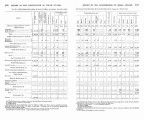| OCR Text |
Show sub~istenoe, the buffalo, by their fear of the wild tribes which have taken possession of their old hunting-grouncls, they h a ~ ger adually been more and more forced to workfor a living. Within t,he last three years many of them have ope~~efadrm s and built themselves houses. A school has also been established, having an attendance of 95 scholars. Theirreser-vation is much larger than necessary, aud pnwision for the sale of one-half of it was made in the act of June 10,1872; but as they decline to dispose of any portion of their lands, the matter cannot be t'i~rther pro-ceeded with at present. While they are averse to selling a portion of their land, however, as proposed by the act of Jurle 10, 1872, it is not unlikely that they would be willing to sell the whole and remove to t,he IndianTerritory, as they manifest an anxiety to follov tribes now tbere, with whom they fbrmerly held intimate relations. With a ~ i e wto the probability of such a change, a deputation of the tribe visited the Indian Territory but a short time since, and, retoruing, reported favor-ably in regard to the matter. It is probable tlrat Congress will at an early date be asked to provideauthority for this disposition of the tribe. Under the treaty made with them March 15,1854, the Otoes and Mis. saurias have a limited annuity of $9,000 for the term of ten Fears, and thereafter the sum of $5,000for the further term of tmelve years, which is paid to them in money, or expended for their benefit. KANSAS. The Iudians still rcm;li~~iiln~ Kg ansas nre the Rickapooa, Pottnrnato-mies. (Prairie h~u d,. .C) l~-i l-) l)e\ra?arn d .\luusees, tli;ln~iesa. nd the J<nusas. or Kaws: Eioknpoos.-The Kickapoos emigrated from Illinois, and are now located, to the number of 290, on a reservation of 19;200 acres, in the northemtern part of the State. During the late war a party of about 100, dissatisfied with the treaty made with the tribe in 1863, went to Mexico. upon repbesentations made to them by certain of their kinsmen liviug in that republic, that they would be welcomed ai~d protected by the Mexican government; but, finding themselves deceived, attempted to return to the United States. Only a fern, however, succeeded in reachingt,he ,Kickapooagency. The Kickapoosnowremaining in Mexico separated from the tribe more tluan twenty years ago, and settled among the soatlrern Indians, iu the Indian Territory, on or near the Washita River, whence they went to Mexico, mhere they still live, notwith-standing t,he eilorts of the Government, of late, to arrange with Mexico for their removal to the Indian Territory and location upon sorne suitable reservation. Their raids across the border bave been a, sore :jtilirtioa to the people of Trr;13, :lnd it is importilnt tllnt the first p~.oruisingo ccnriou 511011111 be tilken t*) #<.curet heir rrtlirn to the Cui t t~l St;tres ;*nd their csti~hlishalent where they mas' be carefulls watched and restrained from their depredatory hagits, & s~unmarilf punished if they persist in them. The Xickapoos remainiug in Kansas are peace-able and industrious, continuing t.0 make commendable progress in the cnltivation of their farms, and showing much interest in the eduoa,tion of their children. Under the provisions of the treaty of June 28, 1562, a few of these Indians have received lauds in severalty, for which patents have been issued, and are now citizens of the United State% Two schools are in operation among these Indians, with a daily average attendance of 39 scholars. By the twaty of Nay 18, 1864, they have an annual appropriation of $5,000 securecl to them ii)r adm:atio~ial aud other beneficial purposes. There is also one more installmeut of anuuity |



































































































